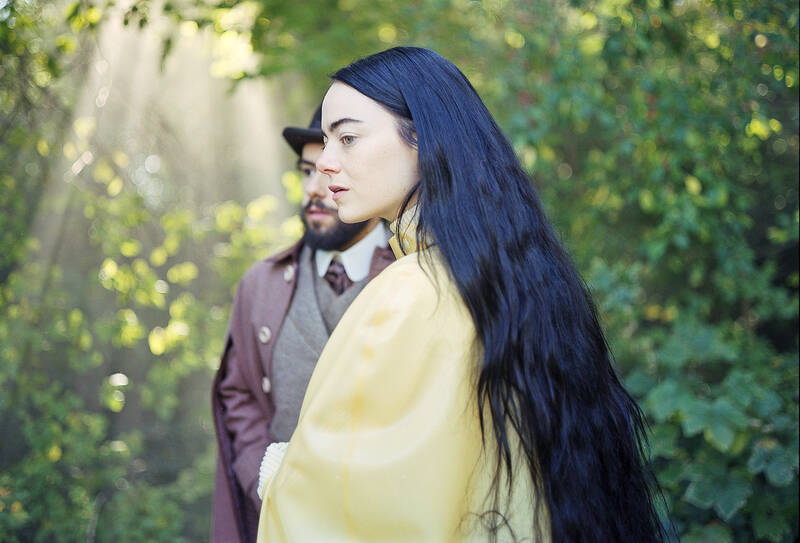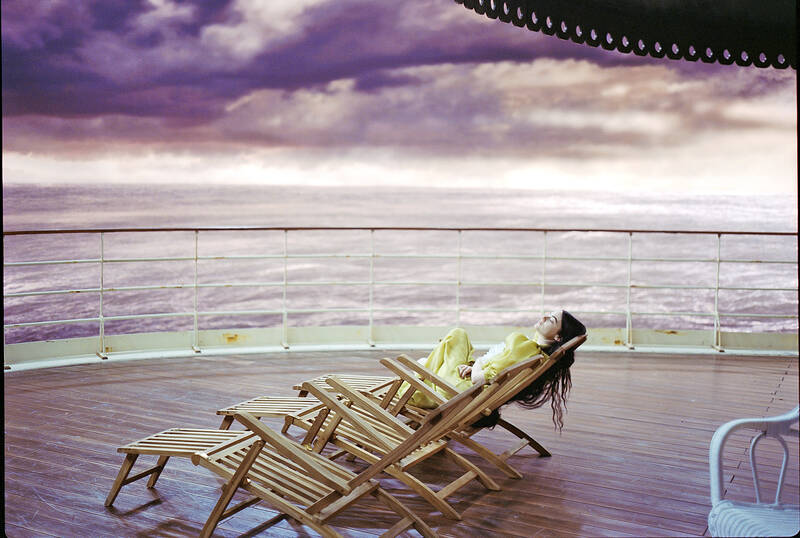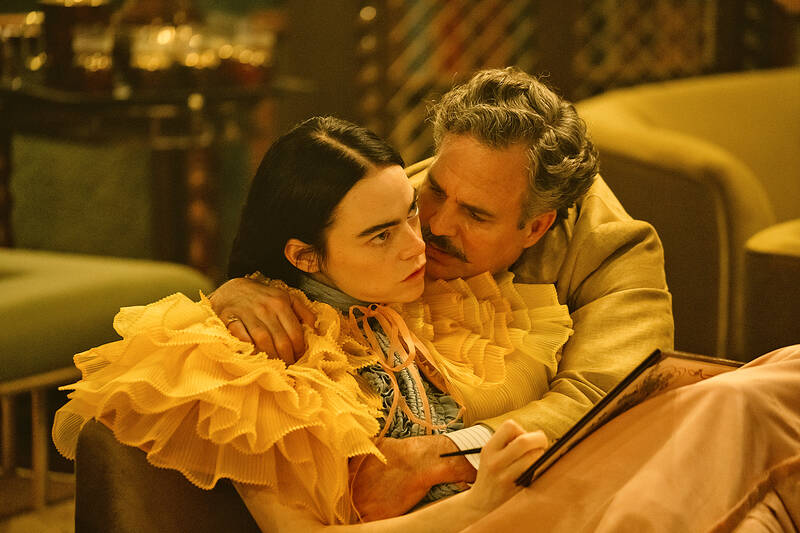It is sickly hilarious to make a movie in which so much consensual sex is had, often so gleefully, that is not the least bit sexy. Though Bella Baxter’s insatiable libido might be her guiding light at first in Poor Things, sexual liberation (or “furious jumping,” as she calls it) is only part of this fantastical, anarchic journey to consciousness.
Filmmaker Yorgos Lanthimos and his star, Emma Stone, have a good and strange thing going whether she’s playing a striving scullery maid who works her way into the favor of Queen Anne, or a re-animated Victorian woman finding independence. Stone helps make his black humor more accessible, and he creates unorthodox opportunities for her to play and stretch. We, the audience, are the benefactors.
Poor Things was not a whole cloth invention. It is an adaptation of Alasdair Gray’s 1992 novel, done by The Favorite screenwriter Tony McNamara whose edges and wit haven’t dulled and in fact flourishes outside the cruelty of the previous film. Don’t worry, the humor is plenty dark here, but self-actualization looks good on them.

Photo: AP
In this depraved and not so subtle fairy tale, men see Bella as a thing to possess and control. Her creator, Dr Godwin Baxter (Willem Dafoe), a mad scientist with violent scars all over his face from a childhood as test subject for his own father, wants to hide her away from the corrupting influences of the world. His horrified student Max McCandles (Ramy Youssef), enlisted to study Bella, wants her to be his wife. And the dandy attorney Duncan Wedderburn (Mark Ruffalo) sees a sex doll, someone with the potential to be as wild and adventuresome as him and eschew the conventional stuffiness of their time. Everyone assumes that Bella will not be too much of a problem. And everyone is wrong.
It wouldn’t be a Lanthimos movie without some immense, irreconcilable discomfort, like using a highly sexualized woman with the mind of a toddler for comedic purposes. But this is hardly the first fairy tale to exploit its heroine for her innocence or naivete. Does it make it better if that’s the point? Is it making light of second-degree rape? Is it the film’s responsibility to answer to? Or is this the prickly post-film debate that everyone is supposed to be having? That is something only the individual can answer.
Stone moves like a doll who hasn’t quite figured out she has joints yet and talks in incomplete, childish sentences. She is not actually mimicking a toddler, it’s something weirder and more fantastical than that. In La La Land she moved as though walking on air. In Poor Things, there is a marionette quality.

Photo: AP
And Bella evolves quickly. She learns to walk and speak and think and masturbate and dance and read and philosophize about inequalities. It does not ever occur to her to not do, or say, exactly what she pleases in this opera of appetites. And her evolution is appropriately messy, taking her to Portugal, Alexandria and Paris, as she figures out her likes and dislikes. You almost want to see her go up against the mean teens in Barbie. Social mores really are the dullest things.
This story exists in a Victorian dream/nightmare, a vision so stuffed with fantasy it reminded me of The Adventures of Baron Munchausen. But it is undoubtedly among the year’s most sumptuous visual delights with production design by James Price and Shona Heath, and costumes by Holly Waddington. Lanthimos and cinematographer Robbie Ryan again employ the fisheye lens that they used in The Favorite. It’s extra, but at least it makes more sense in this purposely disorienting world.
While it is Stone’s movie, all the supporting men are exemplary and unexpected, especially Ruffalo who is so deliriously fun and funny that it’s almost criminal that he hasn’t been unleashed like this before.

Photo: AP

Last week saw the appearance of another odious screed full of lies from the People’s Republic of China (PRC) Ambassador to Australia, Xiao Qian (肖千), in the Financial Review, a major Australian paper. Xiao’s piece was presented without challenge or caveat. His “Seven truths on why Taiwan always will be China’s” presented a “greatest hits” of the litany of PRC falsehoods. This includes: Taiwan’s indigenous peoples were descended from the people of China 30,000 years ago; a “Chinese” imperial government administrated Taiwan in the 14th century; Koxinga, also known as Cheng Cheng-kung (鄭成功), “recovered” Taiwan for China; the Qing owned

In Taiwan’s politics the party chair is an extremely influential position. Typically this person is the presumed presidential candidate or serving president. In the last presidential election, two of the three candidates were also leaders of their party. Only one party chair race had been planned for this year, but with the Jan. 1 resignation by the currently indicted Ko Wen-je (柯文哲) of the Taiwan People’s Party (TPP) two parties are now in play. If a challenger to acting Chairman Huang Kuo-chang (黃國昌) appears we will examine that race in more depth. Currently their election is set for Feb. 15. EXTREMELY

Jan. 20 to Jan. 26 Taipei was in a jubilant, patriotic mood on the morning of Jan. 25, 1954. Flags hung outside shops and residences, people chanted anti-communist slogans and rousing music blared from loudspeakers. The occasion was the arrival of about 14,000 Chinese prisoners from the Korean War, who had elected to head to Taiwan instead of being repatriated to China. The majority landed in Keelung over three days and were paraded through the capital to great fanfare. Air Force planes dropped colorful flyers, one of which read, “You’re back, you’re finally back. You finally overcame the evil communist bandits and

They increasingly own everything from access to space to how we get news on Earth and now outgoing President Joe Biden warns America’s new breed of Donald Trump-allied oligarchs could gobble up US democracy itself. Biden used his farewell speech to the nation to deliver a shockingly dark message: that a nation which has always revered its entrepreneurs may now be at their mercy. “An oligarchy is taking shape in America of extreme wealth, power and influence that literally threatens our entire democracy, our basic rights and freedoms,” Biden said. He named no names, but his targets were clear: men like Elon Musk